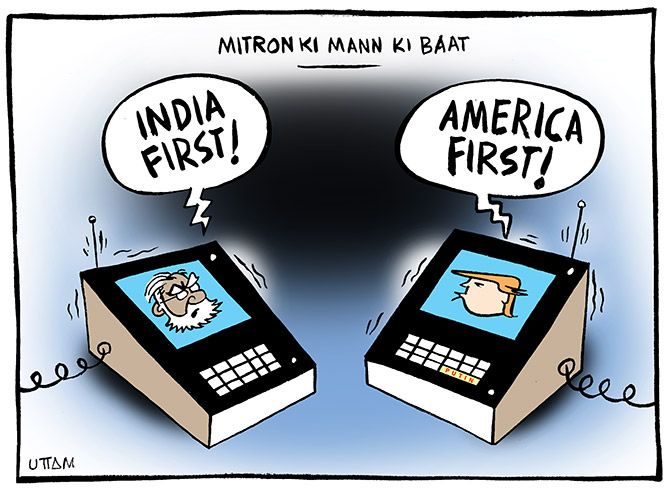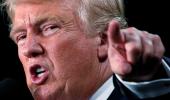'Even if someone other than Trump had become president, the US distancing from Pakistan and coming closer to India was already set in motion.'
'With Trump openly declaring his intent to take on Islamic extremism, the days of US political correctness are over,' says Colonel (Dr) Anil A Athale (retd).
Illustration: Uttam Ghosh/Rediff.com

I have been a regular visitor to the United States since 1991 and been interacting with Washington-based think-tanks, American government functionaries and universities for the last 25 years.
The understanding of American policies is mandatory for any serious security analysis as it has been virtually the fulcrum around which world politics has been revolving for over a century.
Despite the economic rise of China in the last few decades (itself promoted by the US since 1972), it would be realistic to say that the US will continue its domination.
China is only half a superpower and US military reach and effectiveness worldwide is un-matched.
Donald Trump won the US presidential election on the express promise of 'change' and 'disruption' and therefore it is worth speculating what changes this will bring to our part of the world, generally and specifically to India-US relations.
Long term engagement with the Americans prompts me to take a look at the 'real' past before one speculates what changes may occur.
This is not a 'diplomatic' analysis that is based on just one tenure in the US. Diplomats, especially of the Indian variety, tend to forget that they are the foot soldiers of foreign policy, and not policy makers (with some notable exceptions).
Many of these 'diplomatic' analyses are essentially a version of a worm's eye view, a collection of anecdotes or subaltern histories that miss larger geo-strategic issues.
As far as the Indian subcontinent is concerned, the American approach to the region was on the cusp of change from the Cold War era in 2000.
The demise of the Soviet Union and the ousting of the Russians from Afghanistan had a profound impact on the US approach.
At a lecture at Georgetown University in April 2000, I recall an American official pointedly mentioning if the time was now ripe to dump Pakistan!
President Clinton at the fag end of his second term reached out to India. In his first term, his administration, particularly his secretary of state Madeline Albright, was pronouncedly anti-India.
It was Pakistan adventurism in Kargil in 1999 and India's restrained response that led to this change.
George W Bush who succeeded Clinton carried this forward.
In the normal course, India-US relations would have come far closer, but then 9/11 occurred.
Pakistan quickly capitulated and made available its territory to launch attacks on Al Qaeda in Afghanistan.
Some analysts regard the American operations in Afghanistan as a failure. This is totally false and is based on the naive belief in the American political rhetoric of 'nation building' ushering democracy in Afghanistan et al.
The single American aim in Afghanistan was destruction of Al Qaeda and punishment to the Taliban for sheltering the terrorists.
After Vladmir Putin's rise in Russia and the souring of US-Russia relations over Ukraine and Crimea, the northern route to Afghanistan was no longer an option.
Pakistan was vital for logistical support to American troops, who at one point numbered over 100,000.
America waged an unrelenting campaign in Afghanistan to kill Al Qaeda members. With the killing of Osama bin Laden on May 2, 2011 in Abbottabad cantonment in Pakistan and not Afghanistan, the Americans have achieved their military aim.
The secondary aim of preventing Taliban-like extremists from taking over Afghanistan is being achieved by stationing a small garrison and air power.
America no longer needs Pakistan to provide it land access to Afghanistan.
Pakistan milked this American need to maximise its economic and military aid.
At the same time it played a double game of sheltering Islamic extremists since public opinion in Pakistan would have it no other way.
With the American military aid, Pakistan maintained a technological edge over India for the last 16 years.
Bolstered by this American aid, Pakistan continued to fight a proxy war against India.
All this has changed now and for all intents and purposes, the situation is back to what it was in 2000. There are some caveats though.
American and Pakistani intelligence have a long historic relationship and Pakistan has managed to convince the Americans that it is equally against ISIS.
In addition, there is also a long standing bond between the two armed forces built over 70 years of an alliance.
Many in the US state department and the Pentagon look at the Pakistan armed forces as an asset for use in the Middle East.
I have personally seen how Pakistan's ISI chief (Lieutenant General Mehmood who was subsequently sacked for his links to Al Qaeda) could walk into the state department while Indians had to be vetted, checked and escorted!
Over the last 25 years, every Indian discussion with the Americans ended with the Americans pleading Pakistan's case and urging restraint on India's part.
Such was the American need to keep Pakistan in good humour that even though American citizens were also killed in the Mumbai attacks of 26/11, the American response was less than severe!
Even if someone other than Trump had become president, the US distancing from Pakistan and coming closer to India was already set in motion.
With Trump openly declaring his intent to take on Islamic extremism, the days of US political correctness are over.
With his likely outreach to Russia, America will ensure that a northern route to Afghanistan via Uzbekistan and Russia is available to it to support anti-Taliban operations in Afghanistan.
At long last, the Americans may also recognise that India faces a proxy war from Pakistan backed by China.
If the US wants India to check China in Asia, then the US has to back India by building its conventional warfare capability to deal with the proxy war.
With the Trump supported plan to exploit American shale oil reserves, the US is likely to become an oil surplus nation.
This downgrades the importance of the Middle East in American calculations.
In addition, advances in solar tech is reducing the demand for oil.
With the Middle East downgraded in importance, the need to mollycoddle the Pakistan army will also reduce.
In the last two-and-a-half decades, virtually every single terrorist incident has had a Pakistan linkage.
Donald Trump is not likely to shy away from acting against Pakistan.
Pakistan's only game plan is to blackmail the world with a threat of an 'insecure' Pakistan unleashing a nuclear war.
The world and US have seen through this game of Islamabad playing the 'mad mullah' and is unlikely to be fooled again.
It is not unlikely that Pakistan joins the ranks of 'rogue' States like North Korea with its attendant isolation.
The recent outreach by the Gulf countries to India and the visa ban for Pakistani citizens by fellow Islamic States like Kuwait are straws in the wind.
The impending changes in geopolitics of the region augur well for India.
Colonel (Dr) Anil A Athale (retd), a military historian, is the coordinator of the Pune-based think-tank Inpad.











 © 2025
© 2025